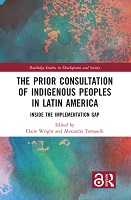Chapter 8 Processes and failures of prior consultations with Indigenous Peoples in Chile
Proposal review
Abstract
In 2008, the first mandate of President Michelle Bachelet and the (much delayed) ratification of ILO169 by Chile relaunched the debate on Indigenous rights throughout the country. In particular, this debate focused on their right to (prior) consultation. Since then, Chile has held a number of consultations with Indigenous Peoples. Some of these processes have focused (and overlapped) on the very same issues over several years. This is the case with the consultations on the constitutional recognition of Indigenous Peoples and the creation of a Ministry of Indigenous Peoples, a National Council of Indigenous Peoples, and (other) Councils of Indigenous Peoples. Between 2009 and 2017, the nine Indigenous Peoples of Chile were consulted five times on some or all of these issues. Furthermore, the legislation over the regulation of this right has changed considerably over the years, creating further confusion. Against this background, this chapter analyses the process and results of selected cases of consultations with Indigenous Peoples in Chile, and explores the reasons for their failures.


 Download
Download